2013高考英语语法复习--倒装
图片预览
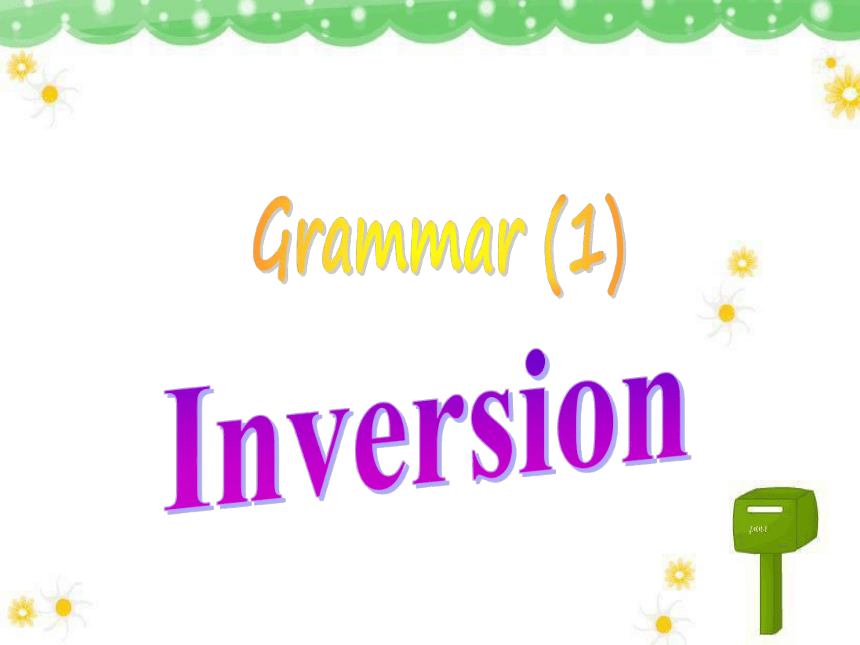
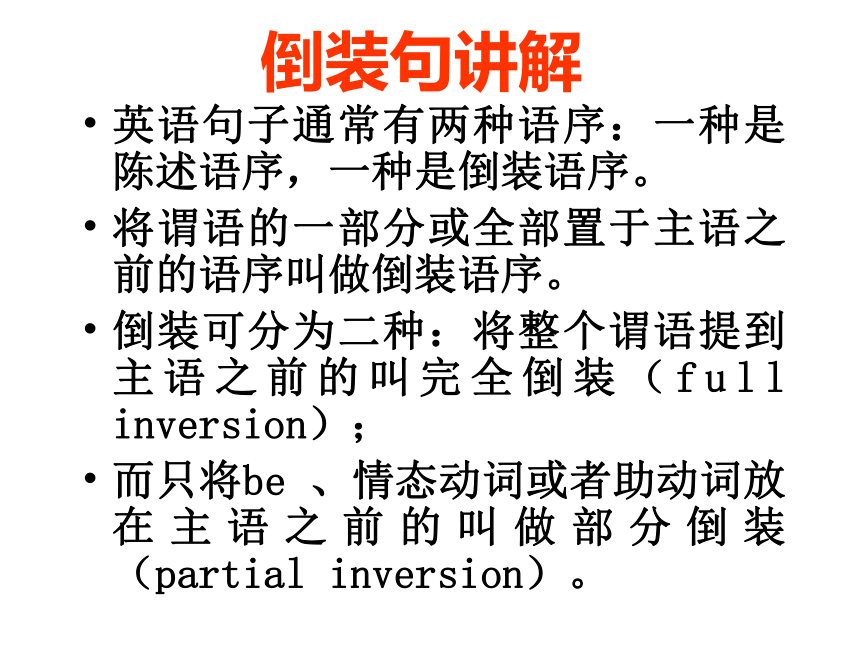
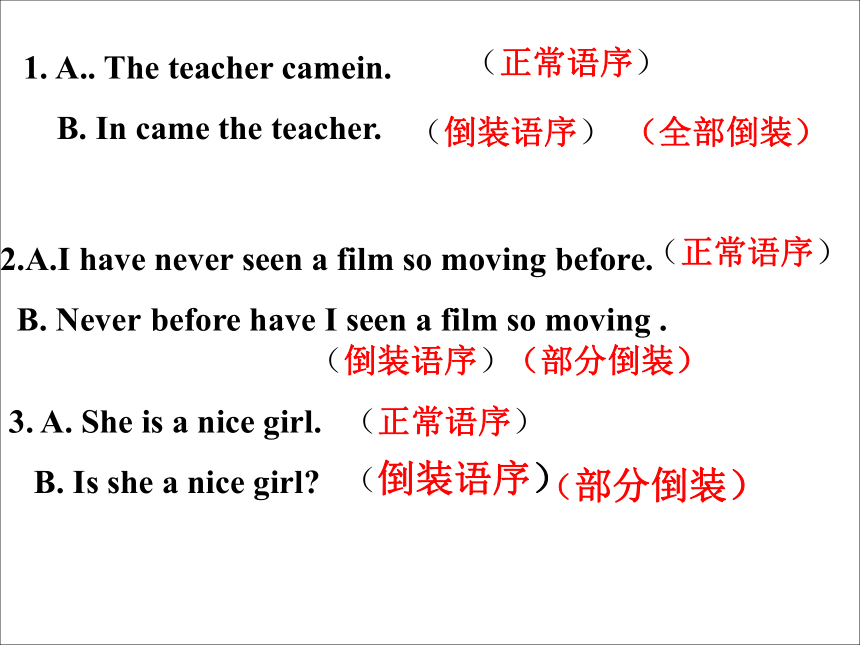
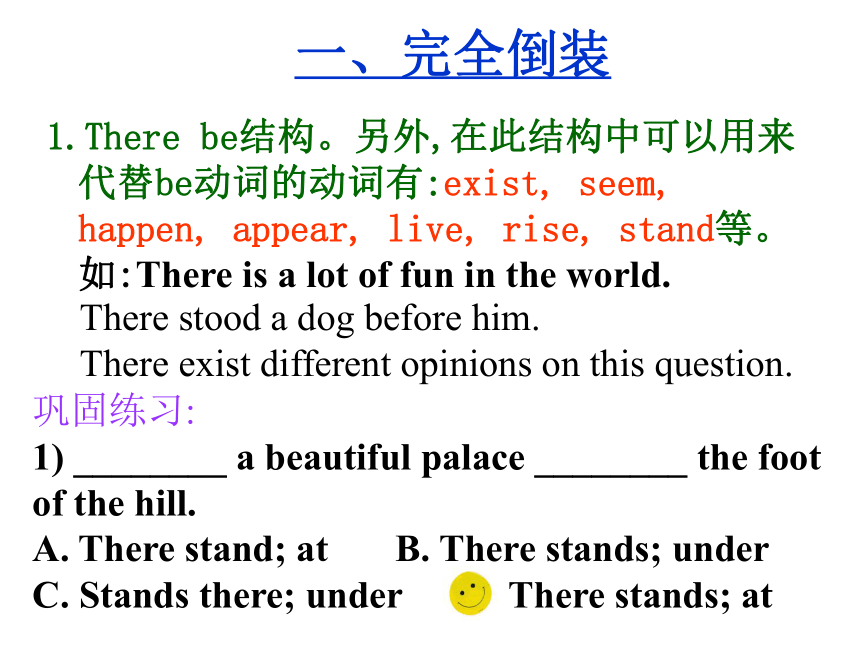

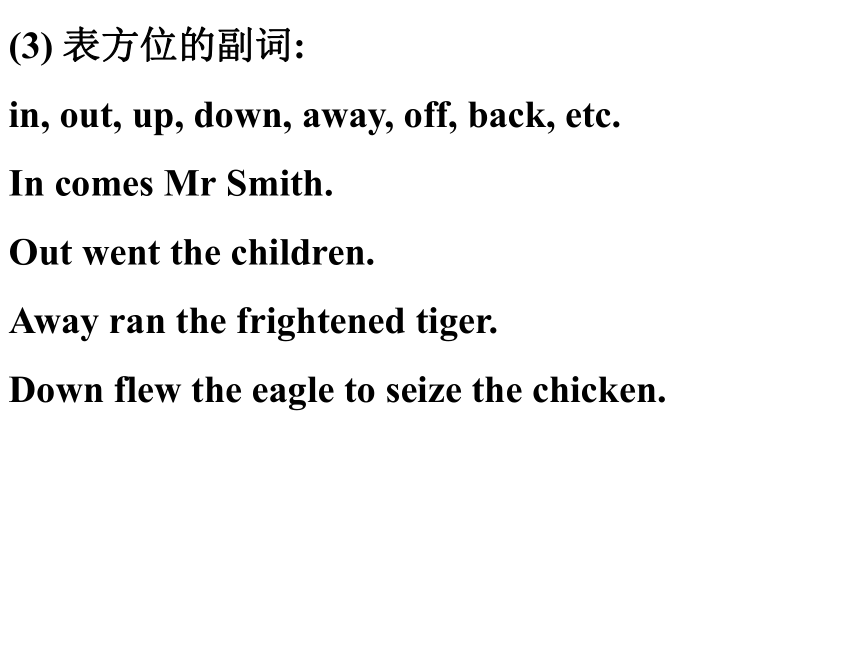
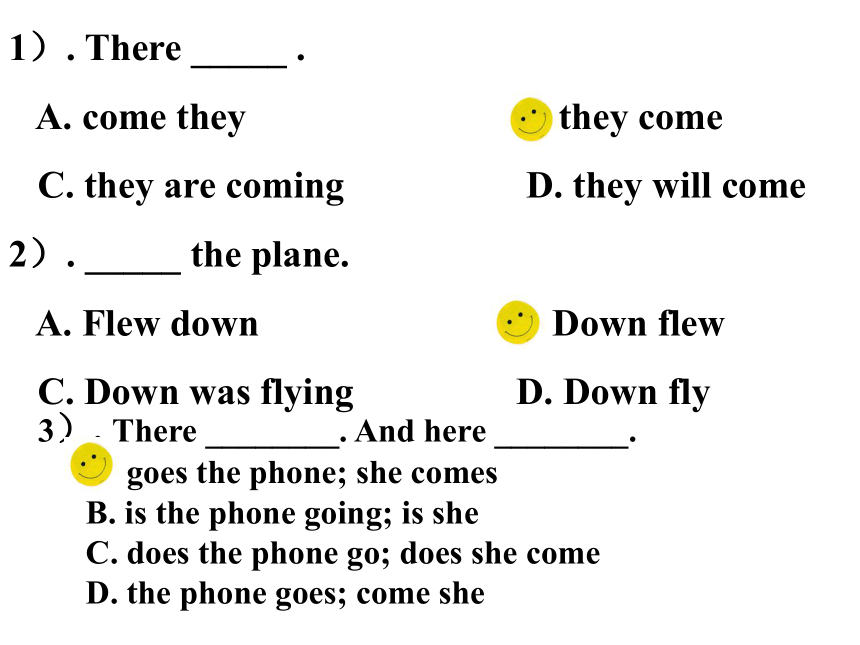
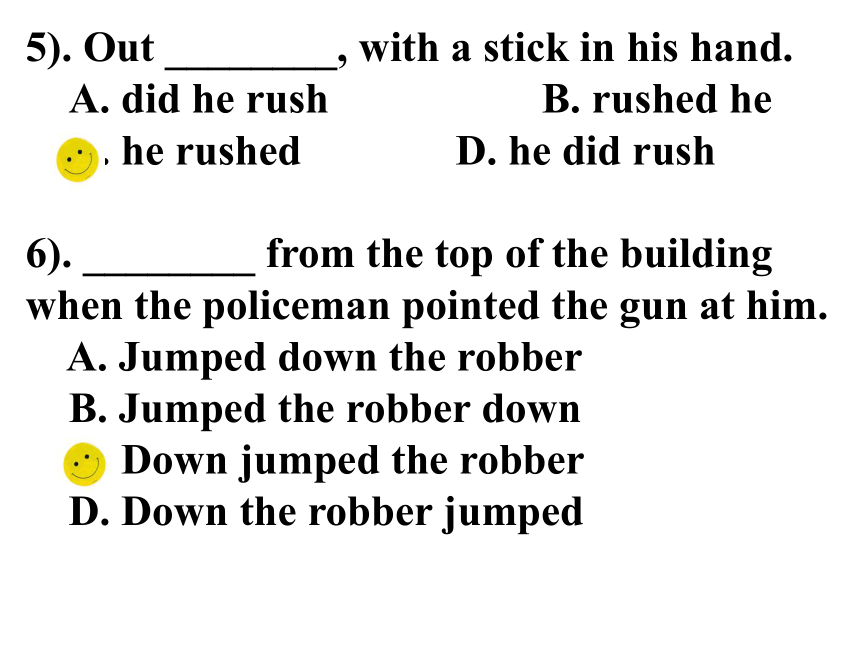
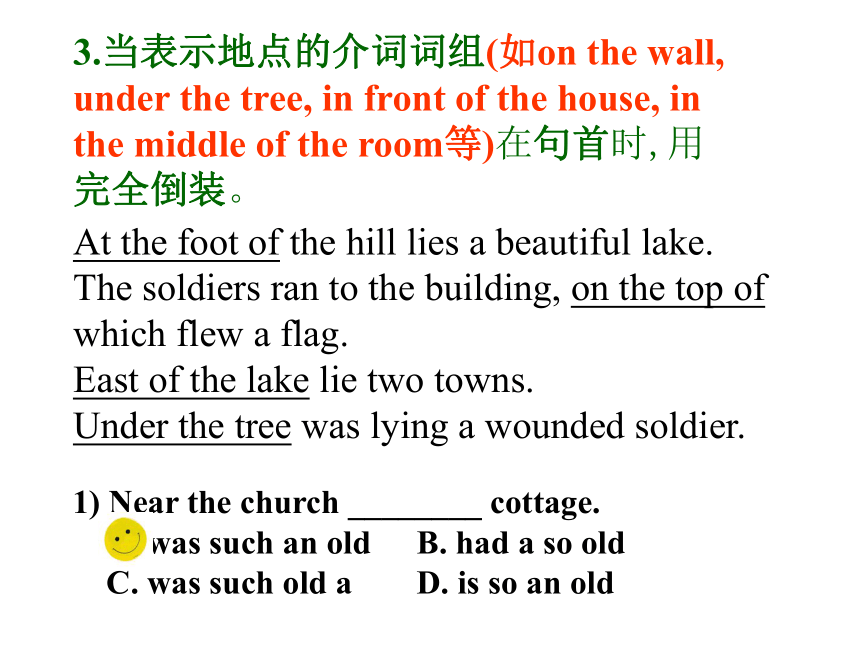
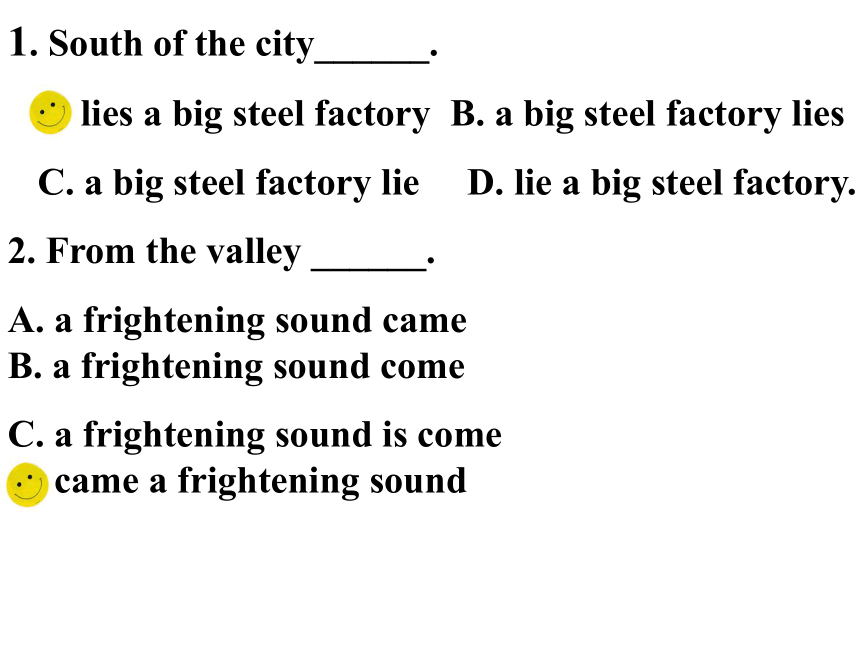
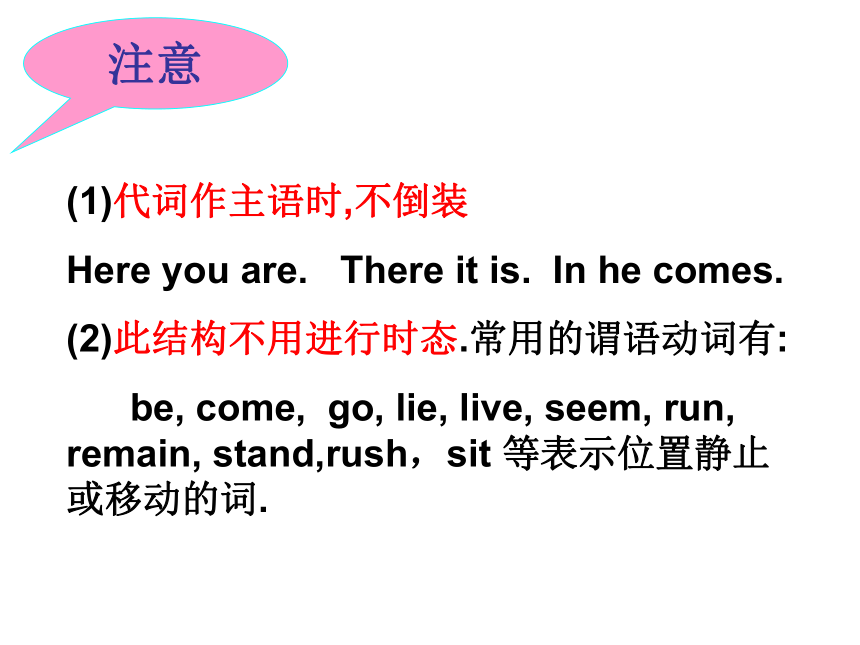

文档简介
课件47张PPT。Grammar (1) Inversion 倒装句讲解英语句子通常有两种语序:一种是陈述语序,一种是倒装语序。
将谓语的一部分或全部置于主语之前的语序叫做倒装语序。
倒装可分为二种:将整个谓语提到主语之前的叫完全倒装(full inversion);
而只将be 、情态动词或者助动词放在主语之前的叫做部分倒装(partial inversion)。A.. The teacher camein.
B. In came the teacher. 2.A.I have never seen a film so moving before.
B. Never before have I seen a film so moving .3. A. She is a nice girl.
B. Is she a nice girl?(正常语序)(倒装语序)(正常语序)(正常语序)(倒装语序)(倒装语序)(全部倒装)(部分倒装)(部分倒装)一、完全倒装There be结构。另外,在此结构中可以用来代替be动词的动词有:exist, seem, happen, appear, live, rise, stand等。如:There is a lot of fun in the world.There stood a dog before him. There exist different opinions on this question.巩固练习: 1) ________ a beautiful palace ________ the foot of the hill. A. There stand; at B. There stands; under C. Stands there; under D. There stands; at2.某些副词在句首,且句子主语为名词
(1)表地点的副词: there, here
Here are my replies to your questions.
There goes the bell.
Here comes the bus.
(2)表时间的副词: then, now
Then came the time to part.
Now comes your turn.(3) 表方位的副词:
in, out, up, down, away, off, back, etc.
In comes Mr Smith.
Out went the children.
Away ran the frightened tiger.
Down flew the eagle to seize the chicken.
1). There _____ .
A. come they B. they come
C. they are coming D. they will come
2). _____ the plane.
A. Flew down B. Down flew
C. Down was flying D. Down fly
3). There ________. And here ________. A. goes the phone; she comes
B. is the phone going; is she C. does the phone go; does she come
D. the phone goes; come she 5). Out ________, with a stick in his hand. A. did he rush B. rushed he
C. he rushed D. he did rush
6). ________ from the top of the building when the policeman pointed the gun at him. A. Jumped down the robber
B. Jumped the robber down C. Down jumped the robber
D. Down the robber jumped3.当表示地点的介词词组(如on the wall, under the tree, in front of the house, in the middle of the room等)在句首时,用完全倒装。 At the foot of the hill lies a beautiful lake. The soldiers ran to the building, on the top of which flew a flag. East of the lake lie two towns. Under the tree was lying a wounded soldier. 1) Near the church ________ cottage. A. was such an old B. had a so old C. was such old a D. is so an old1. South of the city______.
A. lies a big steel factory B. a big steel factory lies
C. a big steel factory lie D. lie a big steel factory.
2. From the valley ______.
A. a frightening sound came B. a frightening sound come
C. a frightening sound is come D. came a frightening sound(1)代词作主语时,不倒装
Here you are. There it is. In he comes.
(2)此结构不用进行时态.常用的谓语动词有:
be, come, go, lie, live, seem, run, remain, stand,rush,sit 等表示位置静止或移动的词.注意4. 作表语的adj, 过去分词,现在分词在句首
(1)形容词表语在句首:
Present at the meeting were Professor White, Professor Smith and many other guests.形容词+连系动词+主语(2) 过去分词表语在句首:
Gone are the days when they could do what they liked to the Chinese people.
Seated on the ground are a group of young people.
(3) 现在分词表语在句首:
Lying on the floor was a boy aged about 5.
Standing beside the table was an interpreter.过去分词+系动词+主语现在分词+系动词+主语1) ________, a man of achievements, deep thoughts, but with simple habits. A. Einstein was such B. Such was Einstein C. Einstein was so D. So was Einstein 2) ________ are the days when teachers were looked down upon. A. Gone B. Go C. To go D. Going
1.“Do you think my clothes fit well?” asked the emperor.
2."Mr smith" said Mary,"May I borrow your pen?“
3.“Where are you going?” he asked.直接引语的全部或一部分在句首时主句要全部倒装。
如果主语是代词时,不用倒装。或谓语比主语长,
或是它后面有宾语时,一般也不用倒装。
“Will you please carry it for me?”said the old man.
“Please do me a favour,” he said.
“He is a liar. You can’t trust him,” Tom said to me
in a whisper.
“Why didn’t you join us!” Our monitor asked me.二、半倒装
半倒装指的是只把助动词或情态动词放在主语前.
1 一般疑问句及某些特殊疑问句:
Can you speak French?
Have you ever seen the movie?
What are you doing?2.否定词在句首:否定词包括:
单词: not,seldom, never, barely, scarcely hardly,rarely, little, nowhere, 等
Not a word did I say to him.
Never shall I do this again.
Little did he know who the woman was.
Hardly did he know that the police were after him.(2)介词短语: at no time/in no way/in no case/by no means/on no account/under no circumstances/on no condition(决不)
By no means is it true that all English people know their own language well.
On no condition must you climb that high wall.
Under no circumstances should you lend him any money.巩固练习: 1) Hardly ____ the airport when the plane took off. A. I had arrived at B. had I arrived
C. had I reached D. I had got to 2) —Have you ever seen anything like that before? —No, _____ anything like that before. A. I never have seen B. never I have seen
C. never have I seen D. I have seen
3). Nowhere else in the world _____ cheaper tailoring than in Hong Kong. A. a tourist can find B. can a tourist find C. a tourist will find D. a tourist has found (1)not until位于句首引起的倒装。
I didn’t leave until he came.Not until he came back, did I leave.The mother didn’t leave the room until the
baby fell asleep.Not until the baby fell asleep did the mother leave the room.1) 直到他来我才离开。2) 直到婴儿入睡妈妈才离开房子。Not until yesterday did I know what he had done.I didn’t know what he had done until yesterday.not until 引起的倒装,主句倒装,从句不倒装。3) 直到昨天我才知道他做了什么事情。总结(2) Not only +(句子) 半倒装,
but (also) +(句子)陈述句形式
Not only did he work faster, but also he worked better.
Not only should we not be afraid of difficulties, but also we should try our best to overcome them.
注意: not only…but also…连接的是并列主语时,不倒装.
Not only Jack but also Mary is my friend. Not only did he make a plan, but he also
carried it out.He not only made a plan, but also he carried
it out.He not only studies hard ,but also he always
helps other classmates.Not only does he study hard, but he also
helps other classmates.1) 他不仅制作了一个计划而且还实施了这个计划。2) 他不仅学习努力,而且乐于助人。(3)
Hardly
Barely + 半倒装 + when + 陈述句形式
Scarcely 即: had + 主+ Vpp… (Ved)
No sooner + 半倒装(had+主+Vpp…)+ than +陈述句(Ved)
Hardly/Barely/Scarcely had he arrived at the station when the train began to leave.
No sooner had she gone out than the telephone rang.You had no sooner finished your homework
than you went out to play.I had no sooner lain down than the telephone
rang.No sooner had I lain down, than the telephone
rang.No sooner had you finished your homework
than you went out to play.1) 你刚一完成作业就跑出去耍.no sooner..than2) 我刚躺下电话就响了。Hardly had the game begun when it started
raining. The game had hardly begun when it started
raining.Hardly had he told the jokes when he began
laughing. He had hardly told the jokes when he began
laughing.3) 比赛刚开始就开始下雨了。4) 他一开始讲笑话他就开始笑。Neither has he called on her, nor will he do so.(4)Neither…nor 连接的两个句子都要倒装He has neither called on her,He will nor do so.Neither has he called on her, nor will he do so.EXERCISES
1). Not only _____ working hark, but also _____ very polite. A. is the boy; he is B . Is the boy; is he C. the boy is; he is D. the boy is; is heA2). No sooner had he finished his talk _____ he was surrounded by the workers. A.as B. then C. than D. whenC3). Not until I began to work _____ how much time I had wasted.
A. didn’t I realize B. did I realize C. I didn’t realize D. I realizeB4). ___ himself wrong, but his friends were wrong. A. Not was only he B. Not only he C. Not only was he D. Not only wasC3 only+状语在句首:
副词
Only + 状语 介词短语 +半倒装
状语从句
Only then did I know I was wrong (副词)
Only in this way can you hope to improve
your English. (介词短语)
Only when he told me did I realize it. (从句)
注:only 修饰主语时,不倒装.
Only he can do this work.1)You can learn from your mistakes only in this way.Only in this way ____ _____learn from your mistakes.canyou2)He stays in bed only when he is seriously ill.Only when he is seriously ill _____ ____ stay in bed.doeshe3).Only Rose ________________.只有罗斯知道真相.knows the truth(若强调的部分不是状语不用倒装)________________________________ 4) Only in this way ____ make progress in your English.
A. you B. can you
C. you be able to D. will you able to
5) Only when the meeting was over___ go back to meet his friend. A. he could B. he was able to
C. was he able to D. was able to he such +名词………...that + 句子
so+ adj./adv………. that+ 句子
(半倒装)
So selfish was she that everyone avoid
talking with her.
Such an interesting book is it that I
want to read it again. 4 so…that/ such…that中So+adj./adv或such..提前到
句首时,前面的部分用倒装语序. (主句) 1) So loudly _____ that ____ hear her clearly. A. did she speak; could everyone
B. did she speak; everyone could C. she spoke; could everyone
D. she spoke; everyone could2). _____ that we all went out, lying in the sun. A. so fine was the weather
B. so was the fine weather
C. the weather so fine was
D. so the weather was fine5 (1)用so作简单回答时表明前面说的肯定情况也适用于另一个人或物,“……也一样” 如:1 He likes swimming in summer very much. __________
We saw the football match last week. _______________
3 The girl can speak fluent English.
_______________
4 I get up at seven and________________So do I.So did they.So can the boy.so does my brother.5 He has never been to Shanghai.
6 He didn’t find any useful material in the book. (2)用neither / nor作简单回答时表明前面说的否定情况也适用于另一个人, “……也不一样 如:Neither have I.Nor did I.7 He didn’t do it and___________________neither / nor did I.(3) 当前面的句子中主语、谓语或肯否定形式不同时,则用so it is with….句型来表示。Tom likes singing, but he doesn't like dancing. Tom is clever and he studies hard. So it is with Mary.So it is with Mary.
--It is hot today. --
--He finished it on time. --注意So it is.So he did.如果后一个句子只是单纯的重复前面句子的意思,则不倒装.(…确实是)1). – John won first prize in the contest. -- _____.
so he did B. so did he C. so he did too D. so did he, too
2). After that we never saw her again, nor _____ from her.
A. did we hear B.we heard C.had we heard D.we have heard
3). – do you know Jim quarrel with his brother? -- I don’t know, _____.
Nor don’t I care B. nor do I care
C. I don’t care either D. I don’t care also
4). –David has made great progress recently. -- _____ , and _____. A. So he has; so you have B. So he has; so have you C. So has he; so have you D. So he he; so you have AABB6 省略if的虚拟条件句
当从句中有were, had 或should时,可省略if,将were, had或should提到主语前,构成半倒装形式.
Were were
Should +主… =if +主 + should …
Had had
Were I a bird, I would fly in the sky.
Should it rain, the crops would grow better.
Had you my troubles, you would despair. Were Jack here, they would be able to solve the problem.
Had I the money, I would buy a new house.
Should he fail in the experiment this time, he would try again.If Jack were here, they would be….If I had the money, I would buy…If he should fail in the experiment this time,….
If he were my friend, I would expect his help.
If it should rain tomorrow, I should stay indoors.
If you hadn’t told me about it, I should never have known the whole thing.Pretty as she is, she is not clever.
2. Try as he would, he might fail again.
3. Difficult as the chemistry homework was, it was finished in time.
4. Much as I like it, I’ll not buy it.7 as引导的让步状语从句,常置于句首,要用倒装语序单数可数名词作表语提前不用冠词即:名词/形容词/副词/分词/动词原形+as+主语+谓语。Child as he was, he had to make a living.1) Unsatisfied _______________ with the payment, he took the job just to get some work experience.
2) ____, he couldn’t get the door open.
A Try as he might B As she might try C She might as try D Might she as try. though/as he wasA虽然他是一个孩子,他懂得不少。,Though/although he is a child, he knows a lot. as不行Child as/though he is, he knows a lot. although不行8 在以often,always,well,once,many a time, now and then, every other day, 等频度副词做状语位于句首时,要用部分倒装结构。Often did I speak of him before.
Many a time has he helped me with my experiment.9 用于某些表示祝愿或口号的句子,习惯用倒装:May you succeed!
Long live China!1) Many a time ________ swimming alone. A. the boy went B. went the boy
C. did the boy go D. did go the boy
将谓语的一部分或全部置于主语之前的语序叫做倒装语序。
倒装可分为二种:将整个谓语提到主语之前的叫完全倒装(full inversion);
而只将be 、情态动词或者助动词放在主语之前的叫做部分倒装(partial inversion)。A.. The teacher camein.
B. In came the teacher. 2.A.I have never seen a film so moving before.
B. Never before have I seen a film so moving .3. A. She is a nice girl.
B. Is she a nice girl?(正常语序)(倒装语序)(正常语序)(正常语序)(倒装语序)(倒装语序)(全部倒装)(部分倒装)(部分倒装)一、完全倒装There be结构。另外,在此结构中可以用来代替be动词的动词有:exist, seem, happen, appear, live, rise, stand等。如:There is a lot of fun in the world.There stood a dog before him. There exist different opinions on this question.巩固练习: 1) ________ a beautiful palace ________ the foot of the hill. A. There stand; at B. There stands; under C. Stands there; under D. There stands; at2.某些副词在句首,且句子主语为名词
(1)表地点的副词: there, here
Here are my replies to your questions.
There goes the bell.
Here comes the bus.
(2)表时间的副词: then, now
Then came the time to part.
Now comes your turn.(3) 表方位的副词:
in, out, up, down, away, off, back, etc.
In comes Mr Smith.
Out went the children.
Away ran the frightened tiger.
Down flew the eagle to seize the chicken.
1). There _____ .
A. come they B. they come
C. they are coming D. they will come
2). _____ the plane.
A. Flew down B. Down flew
C. Down was flying D. Down fly
3). There ________. And here ________. A. goes the phone; she comes
B. is the phone going; is she C. does the phone go; does she come
D. the phone goes; come she 5). Out ________, with a stick in his hand. A. did he rush B. rushed he
C. he rushed D. he did rush
6). ________ from the top of the building when the policeman pointed the gun at him. A. Jumped down the robber
B. Jumped the robber down C. Down jumped the robber
D. Down the robber jumped3.当表示地点的介词词组(如on the wall, under the tree, in front of the house, in the middle of the room等)在句首时,用完全倒装。 At the foot of the hill lies a beautiful lake. The soldiers ran to the building, on the top of which flew a flag. East of the lake lie two towns. Under the tree was lying a wounded soldier. 1) Near the church ________ cottage. A. was such an old B. had a so old C. was such old a D. is so an old1. South of the city______.
A. lies a big steel factory B. a big steel factory lies
C. a big steel factory lie D. lie a big steel factory.
2. From the valley ______.
A. a frightening sound came B. a frightening sound come
C. a frightening sound is come D. came a frightening sound(1)代词作主语时,不倒装
Here you are. There it is. In he comes.
(2)此结构不用进行时态.常用的谓语动词有:
be, come, go, lie, live, seem, run, remain, stand,rush,sit 等表示位置静止或移动的词.注意4. 作表语的adj, 过去分词,现在分词在句首
(1)形容词表语在句首:
Present at the meeting were Professor White, Professor Smith and many other guests.形容词+连系动词+主语(2) 过去分词表语在句首:
Gone are the days when they could do what they liked to the Chinese people.
Seated on the ground are a group of young people.
(3) 现在分词表语在句首:
Lying on the floor was a boy aged about 5.
Standing beside the table was an interpreter.过去分词+系动词+主语现在分词+系动词+主语1) ________, a man of achievements, deep thoughts, but with simple habits. A. Einstein was such B. Such was Einstein C. Einstein was so D. So was Einstein 2) ________ are the days when teachers were looked down upon. A. Gone B. Go C. To go D. Going
1.“Do you think my clothes fit well?” asked the emperor.
2."Mr smith" said Mary,"May I borrow your pen?“
3.“Where are you going?” he asked.直接引语的全部或一部分在句首时主句要全部倒装。
如果主语是代词时,不用倒装。或谓语比主语长,
或是它后面有宾语时,一般也不用倒装。
“Will you please carry it for me?”said the old man.
“Please do me a favour,” he said.
“He is a liar. You can’t trust him,” Tom said to me
in a whisper.
“Why didn’t you join us!” Our monitor asked me.二、半倒装
半倒装指的是只把助动词或情态动词放在主语前.
1 一般疑问句及某些特殊疑问句:
Can you speak French?
Have you ever seen the movie?
What are you doing?2.否定词在句首:否定词包括:
单词: not,seldom, never, barely, scarcely hardly,rarely, little, nowhere, 等
Not a word did I say to him.
Never shall I do this again.
Little did he know who the woman was.
Hardly did he know that the police were after him.(2)介词短语: at no time/in no way/in no case/by no means/on no account/under no circumstances/on no condition(决不)
By no means is it true that all English people know their own language well.
On no condition must you climb that high wall.
Under no circumstances should you lend him any money.巩固练习: 1) Hardly ____ the airport when the plane took off. A. I had arrived at B. had I arrived
C. had I reached D. I had got to 2) —Have you ever seen anything like that before? —No, _____ anything like that before. A. I never have seen B. never I have seen
C. never have I seen D. I have seen
3). Nowhere else in the world _____ cheaper tailoring than in Hong Kong. A. a tourist can find B. can a tourist find C. a tourist will find D. a tourist has found (1)not until位于句首引起的倒装。
I didn’t leave until he came.Not until he came back, did I leave.The mother didn’t leave the room until the
baby fell asleep.Not until the baby fell asleep did the mother leave the room.1) 直到他来我才离开。2) 直到婴儿入睡妈妈才离开房子。Not until yesterday did I know what he had done.I didn’t know what he had done until yesterday.not until 引起的倒装,主句倒装,从句不倒装。3) 直到昨天我才知道他做了什么事情。总结(2) Not only +(句子) 半倒装,
but (also) +(句子)陈述句形式
Not only did he work faster, but also he worked better.
Not only should we not be afraid of difficulties, but also we should try our best to overcome them.
注意: not only…but also…连接的是并列主语时,不倒装.
Not only Jack but also Mary is my friend. Not only did he make a plan, but he also
carried it out.He not only made a plan, but also he carried
it out.He not only studies hard ,but also he always
helps other classmates.Not only does he study hard, but he also
helps other classmates.1) 他不仅制作了一个计划而且还实施了这个计划。2) 他不仅学习努力,而且乐于助人。(3)
Hardly
Barely + 半倒装 + when + 陈述句形式
Scarcely 即: had + 主+ Vpp… (Ved)
No sooner + 半倒装(had+主+Vpp…)+ than +陈述句(Ved)
Hardly/Barely/Scarcely had he arrived at the station when the train began to leave.
No sooner had she gone out than the telephone rang.You had no sooner finished your homework
than you went out to play.I had no sooner lain down than the telephone
rang.No sooner had I lain down, than the telephone
rang.No sooner had you finished your homework
than you went out to play.1) 你刚一完成作业就跑出去耍.no sooner..than2) 我刚躺下电话就响了。Hardly had the game begun when it started
raining. The game had hardly begun when it started
raining.Hardly had he told the jokes when he began
laughing. He had hardly told the jokes when he began
laughing.3) 比赛刚开始就开始下雨了。4) 他一开始讲笑话他就开始笑。Neither has he called on her, nor will he do so.(4)Neither…nor 连接的两个句子都要倒装He has neither called on her,He will nor do so.Neither has he called on her, nor will he do so.EXERCISES
1). Not only _____ working hark, but also _____ very polite. A. is the boy; he is B . Is the boy; is he C. the boy is; he is D. the boy is; is heA2). No sooner had he finished his talk _____ he was surrounded by the workers. A.as B. then C. than D. whenC3). Not until I began to work _____ how much time I had wasted.
A. didn’t I realize B. did I realize C. I didn’t realize D. I realizeB4). ___ himself wrong, but his friends were wrong. A. Not was only he B. Not only he C. Not only was he D. Not only wasC3 only+状语在句首:
副词
Only + 状语 介词短语 +半倒装
状语从句
Only then did I know I was wrong (副词)
Only in this way can you hope to improve
your English. (介词短语)
Only when he told me did I realize it. (从句)
注:only 修饰主语时,不倒装.
Only he can do this work.1)You can learn from your mistakes only in this way.Only in this way ____ _____learn from your mistakes.canyou2)He stays in bed only when he is seriously ill.Only when he is seriously ill _____ ____ stay in bed.doeshe3).Only Rose ________________.只有罗斯知道真相.knows the truth(若强调的部分不是状语不用倒装)________________________________ 4) Only in this way ____ make progress in your English.
A. you B. can you
C. you be able to D. will you able to
5) Only when the meeting was over___ go back to meet his friend. A. he could B. he was able to
C. was he able to D. was able to he such +名词………...that + 句子
so+ adj./adv………. that+ 句子
(半倒装)
So selfish was she that everyone avoid
talking with her.
Such an interesting book is it that I
want to read it again. 4 so…that/ such…that中So+adj./adv或such..提前到
句首时,前面的部分用倒装语序. (主句) 1) So loudly _____ that ____ hear her clearly. A. did she speak; could everyone
B. did she speak; everyone could C. she spoke; could everyone
D. she spoke; everyone could2). _____ that we all went out, lying in the sun. A. so fine was the weather
B. so was the fine weather
C. the weather so fine was
D. so the weather was fine5 (1)用so作简单回答时表明前面说的肯定情况也适用于另一个人或物,“……也一样” 如:1 He likes swimming in summer very much. __________
We saw the football match last week. _______________
3 The girl can speak fluent English.
_______________
4 I get up at seven and________________So do I.So did they.So can the boy.so does my brother.5 He has never been to Shanghai.
6 He didn’t find any useful material in the book. (2)用neither / nor作简单回答时表明前面说的否定情况也适用于另一个人, “……也不一样 如:Neither have I.Nor did I.7 He didn’t do it and___________________neither / nor did I.(3) 当前面的句子中主语、谓语或肯否定形式不同时,则用so it is with….句型来表示。Tom likes singing, but he doesn't like dancing. Tom is clever and he studies hard. So it is with Mary.So it is with Mary.
--It is hot today. --
--He finished it on time. --注意So it is.So he did.如果后一个句子只是单纯的重复前面句子的意思,则不倒装.(…确实是)1). – John won first prize in the contest. -- _____.
so he did B. so did he C. so he did too D. so did he, too
2). After that we never saw her again, nor _____ from her.
A. did we hear B.we heard C.had we heard D.we have heard
3). – do you know Jim quarrel with his brother? -- I don’t know, _____.
Nor don’t I care B. nor do I care
C. I don’t care either D. I don’t care also
4). –David has made great progress recently. -- _____ , and _____. A. So he has; so you have B. So he has; so have you C. So has he; so have you D. So he he; so you have AABB6 省略if的虚拟条件句
当从句中有were, had 或should时,可省略if,将were, had或should提到主语前,构成半倒装形式.
Were were
Should +主… =if +主 + should …
Had had
Were I a bird, I would fly in the sky.
Should it rain, the crops would grow better.
Had you my troubles, you would despair. Were Jack here, they would be able to solve the problem.
Had I the money, I would buy a new house.
Should he fail in the experiment this time, he would try again.If Jack were here, they would be….If I had the money, I would buy…If he should fail in the experiment this time,….
If he were my friend, I would expect his help.
If it should rain tomorrow, I should stay indoors.
If you hadn’t told me about it, I should never have known the whole thing.Pretty as she is, she is not clever.
2. Try as he would, he might fail again.
3. Difficult as the chemistry homework was, it was finished in time.
4. Much as I like it, I’ll not buy it.7 as引导的让步状语从句,常置于句首,要用倒装语序单数可数名词作表语提前不用冠词即:名词/形容词/副词/分词/动词原形+as+主语+谓语。Child as he was, he had to make a living.1) Unsatisfied _______________ with the payment, he took the job just to get some work experience.
2) ____, he couldn’t get the door open.
A Try as he might B As she might try C She might as try D Might she as try. though/as he wasA虽然他是一个孩子,他懂得不少。,Though/although he is a child, he knows a lot. as不行Child as/though he is, he knows a lot. although不行8 在以often,always,well,once,many a time, now and then, every other day, 等频度副词做状语位于句首时,要用部分倒装结构。Often did I speak of him before.
Many a time has he helped me with my experiment.9 用于某些表示祝愿或口号的句子,习惯用倒装:May you succeed!
Long live China!1) Many a time ________ swimming alone. A. the boy went B. went the boy
C. did the boy go D. did go the boy
